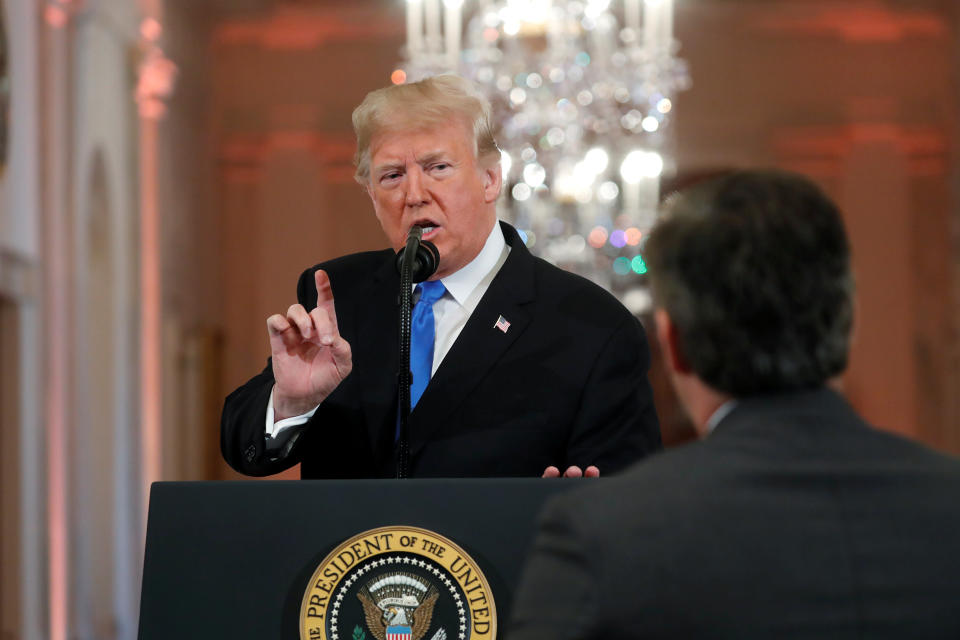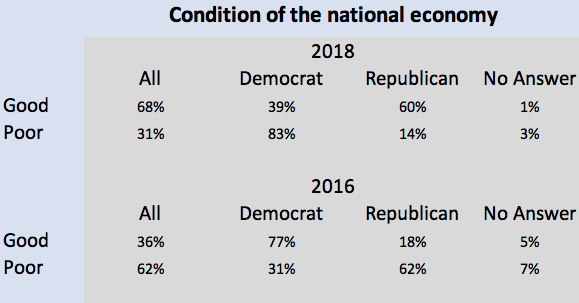Trump's fate in 2020 depends on the economy
The dog that didn’t bark in the midterm elections was the U.S. economy. Normally, it’s the top issue voters worry about. But not this year.
If that’s also the case in 2020, President Trump’s reelection odds ought to be pretty good. Trump’s Republicans lost control of the House of Representatives on Nov. 6, but they lost fewer seats than normally happens for a president whose approval rating is below 50%, as Trump’s is. And they appear to have gained 4 seats in the Senate, when the normal midterm outcome is a net loss for the president’s party. Despite losing the House, Trump and the Republican Party outperformed this year.
The strong economy is a big reason why, and that foretells a key factor for the 2020 presidential race. If the economy remains strong, it would obviously benefit Trump. But if there’s a palpable slowdown or a recession by then, Trump will probably lose a sizable chunk of his support, opening the door to a Democratic challenger and perhaps a sweep of Congress.

Forecasters knew well before the election that the economy was a net positive for Trump and his fellow Republicans. Normally, voters say the economy is their top concern, which is why Bill Clinton’s famous mantra in the 1992 election was, “It’s the economy, stupid.” That has generally been true ever since.
Health care is top of mind
But exit polls show that wasn’t true this year. In CNN exit polls, voters said health care was the top issue, followed by immigration. The economy came in a fairly distant third. While 41% identified health care as the top issue, only 22% fingered the economy.
There’s a huge partisan split, as anybody following politics knows. Of those saying health care is the most important issue, 75% were Democrats and only 23% were Republicans. Of those saying immigration is most important, it’s the exact opposite. Of those saying the top issue is the economy, 34% are Democrats and 63% are Republicans.
But some voters who say the economy is the top issue apparently mean that a strong economy is what they care about. Sixty-eight percent of voters this year said the national economy is “good,” with only 30% saying it’s “poor.” Just two years ago, views were very different. In 2016, just 36% of voters said the economy was good, while 62% said it was poor.

The main takeaway is that the strong economy probably kept some Independent voters in the Republican column, and may have persuaded others to stay home instead of casting a protest vote for Democrats. There are always some voters who punish the incumbent president and his party if the economy is shaky, and they were not much of a force in 2018.
That may not be the case in 2020. Many economists are forecasting a slowdown in growth during the next two years, as the Fed tightens interest rates, the effect of tax-cut stimulus wears off and investors start to hunker down for the next downturn. Without Republican control of the House, there may be no levers Trump can pull to extend the fiscal stimulus a bit longer, so the economy looks good on Election Day 2020. And he could unnerve markets a bit by further berating Federal Research chairman Jerome Powell, for the Fed’s policy of gradually raising rates back toward normal levels.
Like any president, Trump would lose some support if the economy dipped in a way that dented consumer or business confidence. Trump’s base level of support, at around 40% to 45% of the U.S. population, seems unshakeable. But it isn’t. A Yahoo Finance analysis of Trump supporters earlier this year found that only about half of them are Trump’s true “base,” likely to support him no matter what. Many of the rest support him because their business or employer is doing well, they feel more financially secure, and their standard of living is improving. If that changes, people who don’t like Trump’s abrasive policies on immigration or trade, but are grateful for an improving economy, would abandon him.
Trump’s many doubters have learned he has a kind of political superpower that allows him to reach and rally voters other politicians can’t. But Trump may also have unique vulnerabilities that keep his approval rating well below 50% despite the best economy in at least 20 years. That limited the losses for Trump this year. He needs the same economy two years from now.
Confidential tip line: [email protected]. Click here to get Rick’s stories by email.
Read more:
Rick Newman is the author of four books, including “Rebounders: How Winners Pivot from Setback to Success.” Follow him on Twitter: @rickjnewman
